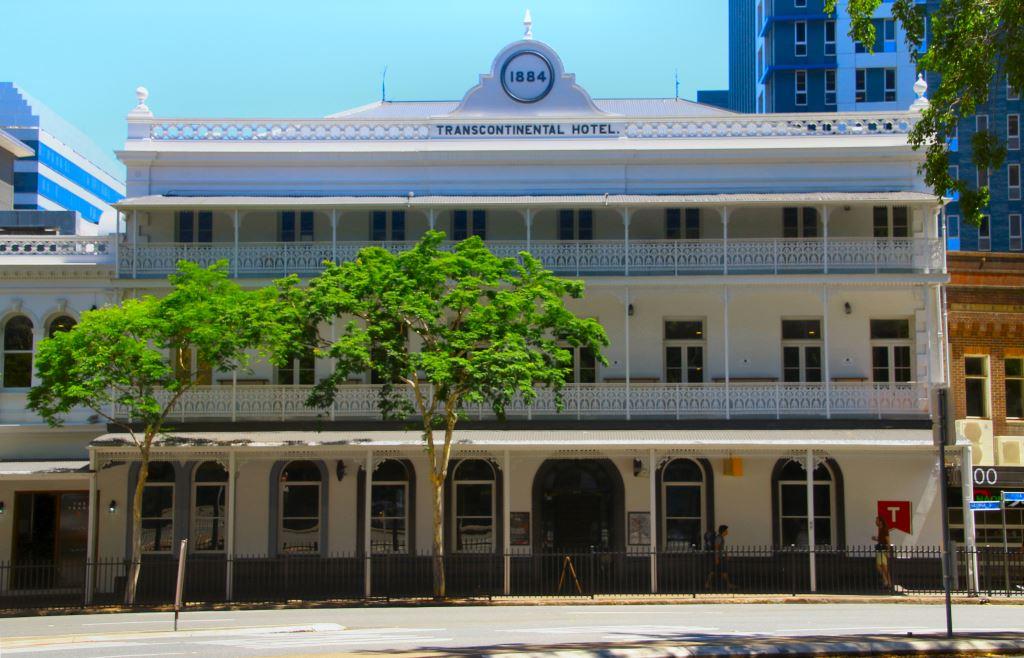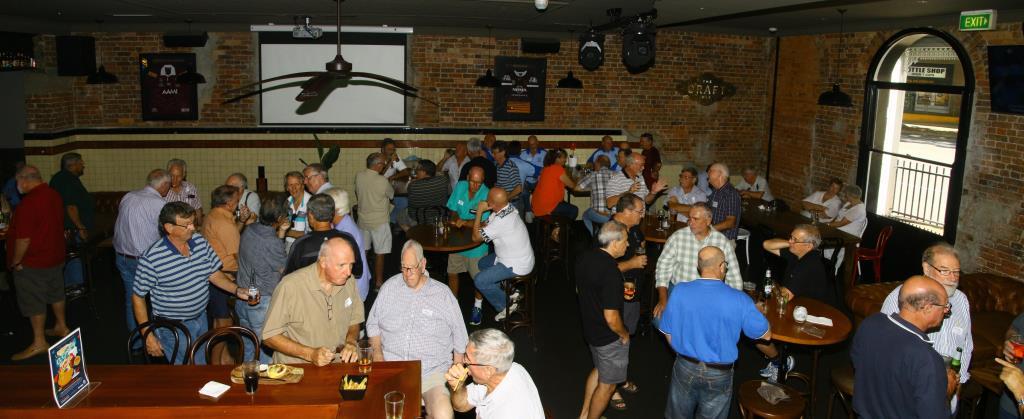|
|
||
|
||
|
Privacy Policy | Editorial Policy | Profit Policy | Join the Association | List of Members | Contact us | Index | Links |
||
|
Back Go to page: 1 2 3 4 5 6 7 8 9 10 11 12 13 14 15 16 17 18 19 20 Forward
|
||
|
|
||
|
Pedro’s Patter.
Excerpt from Jeff’s book – Wallaby Airlines.
Vung Tau and Life in the Villa Anna. 20 – 21 August 1966.
A quick look at my diary showed that I had flown on 13 out of 15 days since my first mission on 5 August. I was ready for some time to myself. It was a Saturday and, although I was Duty Pilot, I had most of the day free.
Being Duty Pilot was a breeze after the dawn to dusk hassle of a flying day. All I had to do was drive crews out to the airfield in the morning, pick them up in the late afternoon, and in between complete some minor administrative tasks, including making out flight plans for the following day. Today being Saturday was also the day to pick up and distribute the flying program.
After dropping the crews at the flight line I drove over to Squadron Headquarters.
Yesterday there had been a lot of talk about a big Task Force operation at Long Tan, a rubber plantation in Phuoc Tuy Province near Nui Dat. (This famous engagement entered Army annals as the Battle of Long Tan). The VC had clearly been bent on testing the resolve of the newly constituted Australian force. The Australians accounted for themselves very well. The operation cost 18 Australian lives against a body count of 245 VC dead. We found out later that D Company, earned a United States Presidential Citation for ‘extraordinary heroism in operations against an opposing armed force’.
Our squadron was not involved. No 9 Squadron and US Army ‘Huey’ squadrons were the key providers of aerial support. However, everyone at Headquarters was still talking about it.
Xuan (pronounced ‘Swan’), our office girl, was already busy typing
the flying program when I arrived. She was a
After collecting the programs, I drove the jeep around to the various places on the distribution list. There was our sister squadron, No 9 Squadron, as well as Transport Movement Control (TMC) and our maintenance hangar. At this stage I had never been into the hangar where our EngO, Wally Solomons, and his hardworking maintenance team serviced and patched up our aircraft. I was well aware though that to keep four, sometimes five, of our seven aircraft in the air each day, Wally’s men had to work through the night under floodlights. Our dawn to dusk schedule did not help matters either.
Looking around for Wally’s office I was conscious of a black pyjama-clad figure standing behind me. It was not an infiltrating VC but ‘Charlie’ (from Victor Charlie), our Vietnamese hangar odd-job man. I am sure he moved as quietly as his namesakes did, but he did not look too menacing, grinning as he directed me to Wally’s office. After distributing the programs I headed off back to the Villa intending to write a letter to my wife.
Wearing only a pair of boxer shorts, I was sitting at the desk in my room, writing pad open in front of me, when Lanh walked in. She picked up Robyn’s photo from my bedside table and looked at me, eyes round with curiosity. ‘This your woman Mistah Perr-ina?’ she asked. ‘Yes, Missy Lanh’, I replied. ‘That is my wife back in Uc Dai Loi [Australia]’. ‘Where your kids Mistah Perr-ina?’ she continued. ‘No kids Lanh. Just my wife and me.’ ‘You got Vietnam girlfriend?’ she persisted. ‘No, Missy Lanh’, I replied. ‘Ah Mistah Perr-ina’, she said, eyes twinkling, ‘You cherry boy!’ She meant I was a virgin.
She gave me a playful dig in the ribs and laughed uproariously at her joke. I laughed with her. It was hard not to. She was such a cheerful girl and flirted with everyone. It would have been easy to take it one step further. Someone already had. Lanh was rumoured to be the de facto widow of an American GI. She had a young son to support. He was downstairs now, playing in our yard with some other Vietnamese children. I watched her as she bustled about the room placing laundered clothes in neat piles on each bed, and collecting the dirty clothes from the laundry baskets underneath.
Then she went out into the corridor to join the other girls, who were cleaning our flying boots and shoes. They sat on the tiled floor polishing, chattering in Vietnamese and giggling. They would stay there until Missy Kim, the senior girl, came in to hustle them on to another task. (Kim had a pleasant, serene demeanour—I was surprised to hear she was later sacked for stealing.)
As might be expected, a few of the blokes did have downtown
Vietnamese girlfriends, in spite of horrendous stories of
I picked up my wife’s picture and stared at it. It seemed like months since I had seen Robyn, yet it was only a matter of weeks. It was three o’clock here. It would be six at home. What would she be doing? Perhaps taking our dog for a walk, or preparing dinner. Maybe she was out in the garden. We had quite a colourful garden in our small house just outside the base. It was a long time before I would see them both again. I looked around the room at the seven beds, each with a mosquito net draped over four poles, one at each corner. Mine also had a flying suit hanging on one pole, ready to put on. Each bed had a small locker beside it which contained, along with the cabin trunks we brought with us, the simple personal belongings necessary to sustain our austere life here. Austere it might be, but it was a helluva lot better than Special Forces ‘hooches’ or Army tents. I was thankful for that.
My desk was near French windows leading onto a balcony. I had
switched off the ceiling fans, enjoying the cool
It was about to rain, usual for this time of day. The distant roll of thunder made a change from the crump of artillery, which could often be heard in the quiet of the evening. I felt drained after the last two days’ frantic activity. My writing pad still lay open in front of me, untouched. But I would get around to writing. I had written each day so far, and enjoyed receiving my wife’s return letters. They were the only link with the real world outside, which was becoming more remote and less believable each day.
Since Mark’s departure two days ago I had had my own permanent bed,
under which I found several dozen boxes of ammunition, along with
miscellaneous flares and smoke grenades. Mark must have been
expecting a VC assault on the V
Mark had also left me an M1 rifle, which most of the pilots considered would be more useful if bailed up with an unserviceable aircraft in some remote location. As an accessory Mark had taped two large ammunition banana clips together, presumably to double his chances in a shoot-out. It did not occur to me to question his reasoning. I took all this firepower with me whenever I went flying.
Compared to the rigid weapon control procedures at RAAF bases back home, the approach to guns and ammunition in Vietnam was casual to say the least. Everyone’s personal weapons were kept near their beds where they were put down after the day’s work, some on bedside lockers, others hanging on bedposts. In spite of this, the only weapons mishap so far was when a 9 Squadron pilot downstairs at the Villa, while cleaning his pistol, accidentally discharged a round into the ceiling (and our floor). The solid construction of the Villa limited the damage to the underpants of those of us in the rooms above.
The rain had now started. There would be the usual few inches, inundating the roads, flushing out the storm drains, cleansing the streets, and turning the dusty roads into thick, brown mud. I was alone now, except for the girls in the corridor. They would disappear before dinner reappearing in the morning, as they always did, to collect our laundry and disturb the slumber of those lucky enough to be able to sleep in. Soon I would also have to leave to drive to the airfield to pick up crews from the returning aircraft. There would be no one here to see the two flights of bats, which lived in our attic, whir down from a manhole in the high ceiling and out through the open corridor windows, minutes apart, as they did each evening at dusk. We called them ‘A Flight’ and ‘B Flight’.
I still had not written my letter but it was time to go. After
sitting in a cool room in boxer shorts it was an effort to put on my
flying gear and side-arms again. Since it was still raining, I
pulled on a waterproof poncho as well. Bumping along the
On the way home, Dick Brice urged me to hurry. ‘It’s Saturday night, party night’, he said. ‘I’ve heard some nurses are coming over’. Dick had plans for sprucing himself up, and winning a heart. Parties here were much the same as any other night except the food was better and, if it is possible, more grog was consumed. Air Force cooks have always enjoyed a good reputation. But there is little anyone can do with frozen ham steaks, pressed turkey, etherised eggs and an endless supply of lima beans—our staple fare. I had never heard of etherised eggs or lima beans until I went to Vietnam, then they were served up 365 days in a row. As for ham and turkey, it took about three years after I returned home before I could look at either.
On my first Christmas home the family wondered why I nearly threw up when the traditional roast turkey was proudly placed on the table. But tonight was different. Now and then we were able to get fresh food. The catering officer had contacts that occasionally produced prawns and lobster, and we could sometimes get salad vegetables from Dalat and cheeses from home via the C-130 couriers. The dining room staff had everything arranged decoratively, buffet style, in the bar annexe. I looked around for the nurses. There were two of them, a white-haired US Army colonel and her sidekick, a portly major who must have been at least 45, their matronly figures squeezed into jungle green fatigues. Both were talking animatedly to a couple of our senior mess members. My eyes met those of Dick who was dejectedly draining his beer glass. I went over to commiserate. ‘Not much chop, eh Dick?’ I said, handing him a fresh beer. I followed his gaze across to the bar door. In swept another female also in green fatigues. This one was decidedly better looking, and about 15 years younger than the nurses.
‘Who’s she?’ I asked Dick. ‘That’s Jeannie, the Red Cross bird’, said Dick with a wink. ‘Don’t worry, we won’t get a look in. She only goes for American flyboys.’ Sure enough, after doing the rounds of the bar, talking and laughing loudly, she left arm in arm with a US Army lieutenant colonel who had been talking to our CO. ‘Not to worry, Dick’, I consoled him. ‘We’ll have a few grogs instead’.
Sunday, like every other day, was a working day, although the scale
of activity was less than during the rest of the week. I had drawn
the only flying sortie, the Saigon-Bien Hoa courier. This mission
ran first thing in the morning, and again late in the afternoon.
There was time in between to join a jeep load of people going to the
beach. The back beach, where we swam, was on the other side of town.
It was supposedly unpolluted, unlike the front beach near the Villa
Anna. Getting there involved a drive through the outskirts of town,
past the large stucco and terracotta tiled Catholic Church and,
further on, two Buddhist temples decorated with dragon-head
gargoyles and religious symbols, which looked like a back-to-
The beach was hidden from the road by clumps of bamboo growing in the marshy flats between the sand and a meandering stream. There were crowds of people sprawled on the sand or playing handball. They were nearly all off duty military personnel, many in uniform or a zany mixture of uniform and civilian clothes. The Americans, with their crew cuts and check shorts, were easily distinguishable from the more conservative Australians, as were the chunky-looking Koreans from the slim Vietnamese. As we arrived a VNAF Skyraider flew along the water’s edge at about 20 feet causing several bathers to throw themselves flat on the sand, and others to shake their fists angrily as it zoomed out of sight behind the nearby headland. Perhaps this was why the following notice later appeared in the Aerodrome Directory under ‘Aerodrome Remarks’ for Vung Tau:
‘Flights along beach area below 500 feet prohibited’.
‘Dumb asshole’, remarked an American laying out his towel on the sand near us. There were no inspectors or change rooms at this beach. One simply stripped off in full view of the other bathers, even though there were a few women present. We splashed in like six-year-olds. The water, not quite tepid, was nevertheless invigorating. I felt purged and fit again. As I waded back up to the shore a sea snake wriggled its way into the water beside me. No one seemed to take any notice, as though this happened all the time, and the snake did not seem interested in me or the other bathers. So I affected an air of nonchalance, preferring to risk death from its venomous fangs than to make a fuss about nothing.
The afternoon shadows were lengthening as the CO and I climbed into
our aircraft for the pm courier. The Caribous were parked nose-in
along the wall of our maintenance hangar so that you had to reverse
out of the lines onto the PSP apron adjacent to the east-west
runway. The crew chief sat on the open back ramp, his headset on a
long lead so he could give directions to us over the intercom. It
seemed funny going to work after a half-day at the beach, but that
was typical of our routine here. We had no set days off. If we were
required to fly we flew, sometimes ten days in a row. If we were not
required for flying we were free to come and go as we pleased,
within the restrictive limits placed on us by security and
transport. The town of Vung Tau was secure so you could walk
downtown, or go to the beach if a jeep was
We climbed out around the green hill on the tip of the Cap St Jacques peninsula, and over the ships at the mouth of the river. Because of the low cloud the CO chose to fly low level up the river along the shipping lane. This did afford a measure of protection since the river was two miles wide at this point. But I felt a twinge of uneasiness as the mangrove swampland each side had been known to harbour snipers, and aircraft and shipping had been fired on. Vung Tau itself had actually been subject to a mortar attack from a mud island in the river estuary the previous March, causing a hole in the hangar roof and minor damage to two aircraft.
Recently, for added protection, much of the mangrove areas had been defoliated with chemicals sprayed from the air. I had seen the defoliation aircraft from above, converted C-123s, flying in patterns towards Saigon and back, trailing clouds of poisonous spray, which turned the green marshes into a brown wasteland. God knows what it did to people.
Bien Hoa was a large fighter base near the city of the same name about ten miles north-east of Saigon. We came in here these days with mail and supplies for the Australian medical team, a volunteer group of civilian doctors and nurses who had set up a hospital here under a civil aid plan. Prior to this, squadron aircraft came in support of the Australian Army battalion, which had been based here since April 1965.
When the Australian Army commitment was increased by another battalion and support units, the newly constituted Task Force moved to Phuoc Tuy Province, its new area of responsibility. This event happened a couple of months before I arrived in the country. Our greatest problem getting into Bien Hoa was avoiding gaggles of fighters, which were continually arriving and departing. We had to fly uncomfortably low at some distance from the field, giving the CO the opportunity to point out a bridge blown up by the VC a week ago, then dart in during a break in the traffic.
|
||
|
|
||
|
|
||
|
TMC at Tan Son Nhut had 24 passengers for our return flight to Vung Tau, including Americans, Australians and Vietnamese. There were more than twice that number of Vietnamese clamouring around the aircraft, waiting for a sign that they might be accepted, or waiting to be pushed away. At some of the smaller airfields, swarms of Vietnamese often rushed out to the aircraft, sometimes even trying to jump onto the open cargo compartment door while the aircraft was taxiing. They rarely seemed to know or care where the aircraft was going, as long as it was somewhere else, or realise they needed military authorisation to travel.
Here at Saigon they were more subdued, thanks to base security and the efforts of TMC. But they were going to try all the same. Our crew chief today was Dick De Friskbom, a sergeant and the senior loadmaster at Vung Tau. When we climbed aboard Dick was scratching his head. The manifest listed 24 passengers, but a head count produced 25. All claimed the right to travel. He decided to call names. After calling 23 names a grizzled US Army sergeant and an impassive Vietnamese private remained. Dick’s credulity was severely strained when he called the last name—‘MacRobertson’—and both the American and the Vietnamese replied, ‘Present’.
The unfortunate Vietnamese was ejected.
That evening I drove downtown for the first time so Mick Lewino
could pick up a pair of slacks he had had made at one of the many
Indian tailor shops. We drove through the town square, with its
monument bedecked in allied flags and banners bravely proclaiming
‘Peace and Prosperity with the Help of Our Allies’ in Vietnamese, to
the huddle of
I waited outside the tailor shop in the jeep, fascinated by the passing scene. A bar-girl came out of her crummy-glittery-dark premises to try to attract more custom. Business was slack so she bought a snack from a wizened old man sitting at a tiny kerbside pushcart with a little kerosene stove on top. He cut up and cooked strange-looking meat, mixed with a spaghetti-like substance, which he put out for sale on paper plates. A fuel lamp on top of the cart provided only enough light to make his activities look sinister. Two young boys arrived nearby and opened cases containing sunglasses, combs and curios. They squatted on the footpath beside their wares, loudly exhorting custom from passers-by. Seeing me, one came over offering goods, then his sister, and finally his brother. I politely declined each in turn. Grubby children fought the way children do anywhere. A middle-aged Vietnamese woman held a baby up to me. She did not look destitute so I did not know what she wanted me to do. I might have helped in some way if I could have understood what she was saying. A wretched, legless beggar lying on a small, four-wheeled cart dragged himself across the street with surprising dexterity. Other Vietnamese shouted at him as if he was a nuisance.
I glanced over at the tailor shop. So many men were coming out of it I suspected there was more going on inside than clothing manufacture. Finally Mick came out with his slacks, dispelling my suspicions, and we left the bustling scene behind.
The Villa was quiet when I returned, in contrast to the previous night’s festive atmosphere. A small group at the bar was ordering rounds of exotic drinks to relieve their boredom. At 25 cents a drink this was an inexpensive pastime. John Harris and a couple of other blokes were about to start a game of cards. John motioned me towards an empty chair. I sat sipping a rum and coke, half-concentrating on the game, wondering what the next week would bring. I had packed a lot into my first few weeks here, seen half the country in the process, and logged quite a few flying hours. I was starting to feel at home in this strange environment.
|
||
|
I don’t feel my age. In fact, until midday I don’t feel anything at all, then it’s time for my nap!
|
||
|
All-Appy reunion – Brisbane.
On Saturday the 25 Feb, a bunch of about 90 ex- Appies who live
(mainly) in Queensland and Northern NSW, and their ladies, got
together at the Transcontintal Hotel in Brisbane for their annual
get together. They came from far and
This year’s event, which kicked off about mid-day and rattled on until nearly dark, was once again organised by Rob Wilson and his committee. The event wasn’t just for ex-Wagga Brats either, there were several ex-Brats from Laverton and as Rob says, it’s a good thing, this is an All-Appy event, and the Radschool Brat number is increasing each year. There is an All-Appy website, you can see it HERE.
27 Appy took out the prize, with 13 blokes from the Rats getting together, these blokes graduated from Wagga on the 26 June 1974.
The final Appy course at Wagga (46 Appy – Sprogs) graduated on the 29 March 1993, the final from Laverton was 45 Appy which graduated on the 8th December 1992.
The Trans Hotel (as it is known) is a popular spot for reunions and get togethers as it is directly opposite one of Brisbane’s major train and bus stations and revellers can get to the event, enjoy the odd one or six, then just wander back across the road and get home again safe and sound. |
||
|
Instead of offering “walk around” finger food, Rob had organised for the Hotel to offer a lunch menu which was included in the $20 entrance. People bought their own drinks.
Food on offer included the following:
Names in the following photos are set out left to right. The photos have been crunched to allow quicker opening. You can get the HD version which you can download should you wish, by clicking each pic.
Some of those that attended.
|
||
|
|
||
|
A recent study has found that women who carry a little extra weight, live longer than the men who mention it. |
||
|
|
||
|
Allan Uhlmann (16 Appy), Bev Kane. |
||
|
Barry (8 Appy) and Jasmine Jacka. |
||
|
Bev and Ken (11Appy Gunny) Kane, Terry Carmody (21Appy), Bill Hewson (29Appy Arm). |
||
|
Bill Moore (16Appy), John Gracey (12Appy), Dave Lee (15Appy). |
||
|
“Butch” Borchert (21Appy)., Norm Pesch (28Appy), Terry Waddington (18Appy). |
||
|
Charlie Downs (11Appy) Dave Henkel (11Appy). |
||
|
|
||
|
Did you know that dolphins are so smart that within a few weeks of captivity, they can train people to stand on the very edge of the pool and throw them fish? |
||
|
|
||
|
Doug Pickering (20Appy), Norm Bruce (21Appy). |
||
|
|
||
|
Jackie Thomson, Ewen Thomson (27Appy). |
||
|
|
||
|
Ann Bartlam. |
||
|
|
||
|
Gayle and Keith McAlinden (25Appy), Ewen Thomson (27Appy). |
||
|
|
||
|
Graham Bickle (10Appy – Inst), John Pickard (14Appy), Geoff Dickerson (8Appy – Radio), Greg Dowling (18Appy – Radio). |
||
|
|
||
|
Gayle McAlinden, Jackie Thomson.
|
||
|
Kaye and Ralph Donelan (15Appy). |
||
|
|
||
|
My therapist says I have a preoccupation with vengeance. We'll see about that. |
||
|
|
||
|
Ewen Thomson (27Appy), Steve Nelson (27Appy), Ken Gould (27Appy), Mick Ohlin (27Appy). |
||
|
|
||
|
Kaye Donelan, Kay Middleton, Keith Row (15Appy), Trish Row. |
||
|
Ken Bischof (18Appy), “Blue” Bock (19Appy), Bill Hewson (29Appy Arm) |
||
|
|
||
|
Kev Riley (24Appy), Paul Johnson (26Appy, Don Worner (15Appy). |
||
|
|
||
|
Maurie Simons (17Appy), Greg Dyce (20Appy). |
||
|
Jock Fiddes (8Appy), Rob Wilson (15 Appy), Lindsay Bennett [front] (11Appy – radio). |
||
|
|
||
|
31 Appy Bods. |
||
|
Mick Yarrow, Kev Ford, Clayton Wilson, Rob Burton, Derek Hibbs, Mark Bartlam, Mark Ramsay. |
||
|
Wal Curry (24Appy), Kev Riley (24Appy). |
||
|
Rhonda Dowling, Nancy Pickard, Barbara Dickenson. |
||
|
|
||
|
Strong people don't put others down. They lift them up and slam them on the ground for maximum damage. |
||
|
|
||
|
Towards the middle of the afternoon, after Rob had welcomed all for attending and the troops had been coerced into buying bunches of raffle tickets, Rob decided it was time to dip into the hat and find a few winners.
|
||
|
|
||
|
|
||
|
Graham Bickle was first off the rank, Graham won the first prize and had the option of taking a new S class Benz or a bottle of whiskey. Wisely, he chose the whiskey.
|
||
|
Mark Ramsay won second prize and he had the option of taking a first class, three week all expenses paid world trip, flying Singapore Airlines or several packets of curry powder. Mark of course chose the curry powder.
|
||
|
Third prize winner was a jubilant Mike Yarrow (the 31 Appy boys bought a thousand tickets). Mike was given the difficult task of choosing between a fully furnished penthouse on the Gold Coast or a bottle of NZ Sauv Blanc. No need to guess which one he took.
|
||
|
If you’re an ex-Appy and you missed it - you missed it!. The Brisbane Appy reunions are getting bigger and better, thanks mainly to Rob Wilson who organises the whole thing.
If you’re an ex-Appy and you’d like to meet old mates and relive those early informative years of your life, put a big mark against February in next year’s calendar and keep an eye on their web site http://www.allappys.com/
|
||
|
|
||
|
|

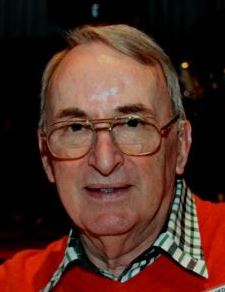
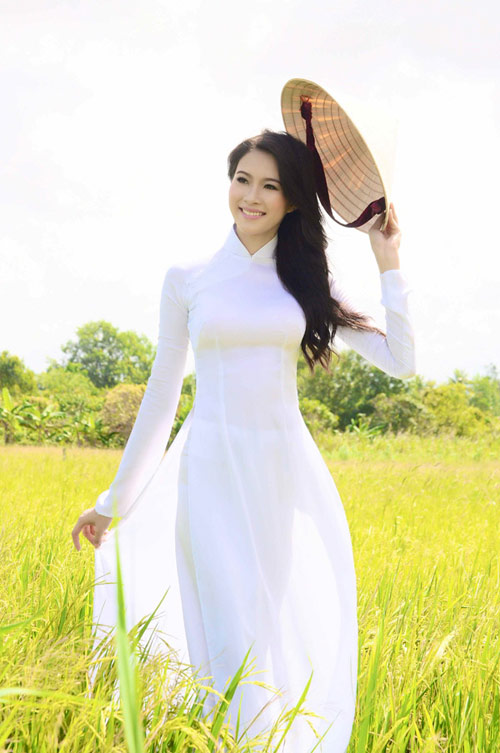 cheerful young soul, like our house girl Lanh. But there the
resemblance ended. Xuan was attractive and slender and still wore
the white ao dai of a young unmarried girl. Not long out of school
and from a reasonably well-to-do Catholic family, she displayed a
charming naivety, and was therefore constantly teased. The poor girl
took fright at the slightest amorous advance (and there were
plenty), blushing at enquiries from red-blooded single pilots about
her boyfriends. But she was also a good sport and always ended up
laughing with her Australian tormentors.
cheerful young soul, like our house girl Lanh. But there the
resemblance ended. Xuan was attractive and slender and still wore
the white ao dai of a young unmarried girl. Not long out of school
and from a reasonably well-to-do Catholic family, she displayed a
charming naivety, and was therefore constantly teased. The poor girl
took fright at the slightest amorous advance (and there were
plenty), blushing at enquiries from red-blooded single pilots about
her boyfriends. But she was also a good sport and always ended up
laughing with her Australian tormentors.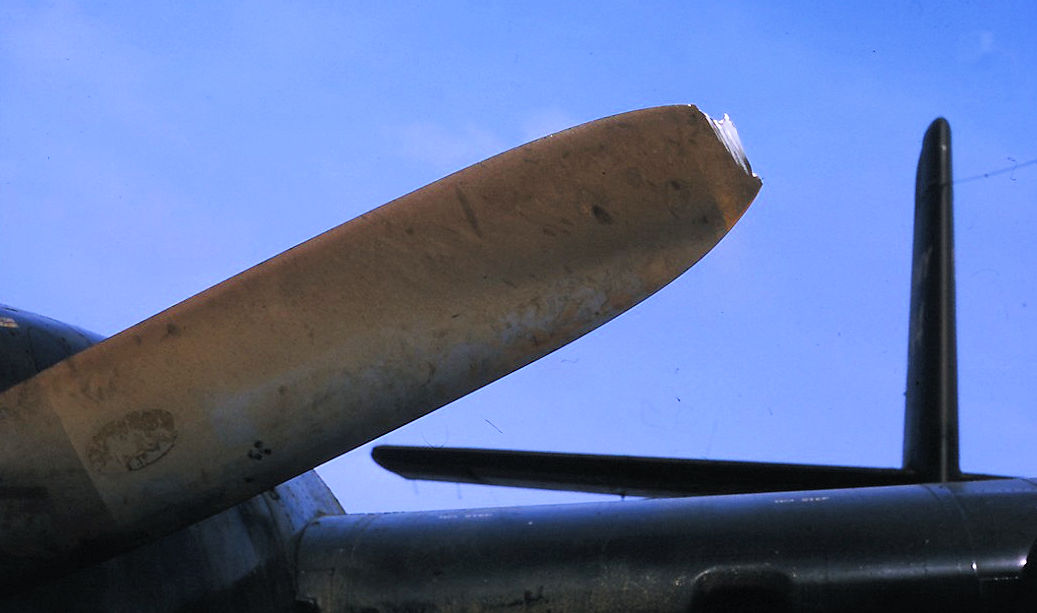 Our
squadron shared hangar space with No 9 Squadron, so maintenance work
on the Caribous often had to be carried out outside the hangar. The
floodlights, specially designed and made in Australia, had their own
power plants so night-time work could be carried out on aircraft
parked at some distance from the hangar. The lights were
particularly useful for doing routine smoothing of propellers
damaged by debris thrown up during landings on rough strips. Work on
the tall tailplane was possible using a ‘cherry picker’ brought to
Vung Tau by C-130 in the early days. Wally and his team were
instrumental in earning the Australian Caribous the reputation of
‘the best maintained machines in Vietnam’.
Our
squadron shared hangar space with No 9 Squadron, so maintenance work
on the Caribous often had to be carried out outside the hangar. The
floodlights, specially designed and made in Australia, had their own
power plants so night-time work could be carried out on aircraft
parked at some distance from the hangar. The lights were
particularly useful for doing routine smoothing of propellers
damaged by debris thrown up during landings on rough strips. Work on
the tall tailplane was possible using a ‘cherry picker’ brought to
Vung Tau by C-130 in the early days. Wally and his team were
instrumental in earning the Australian Caribous the reputation of
‘the best maintained machines in Vietnam’.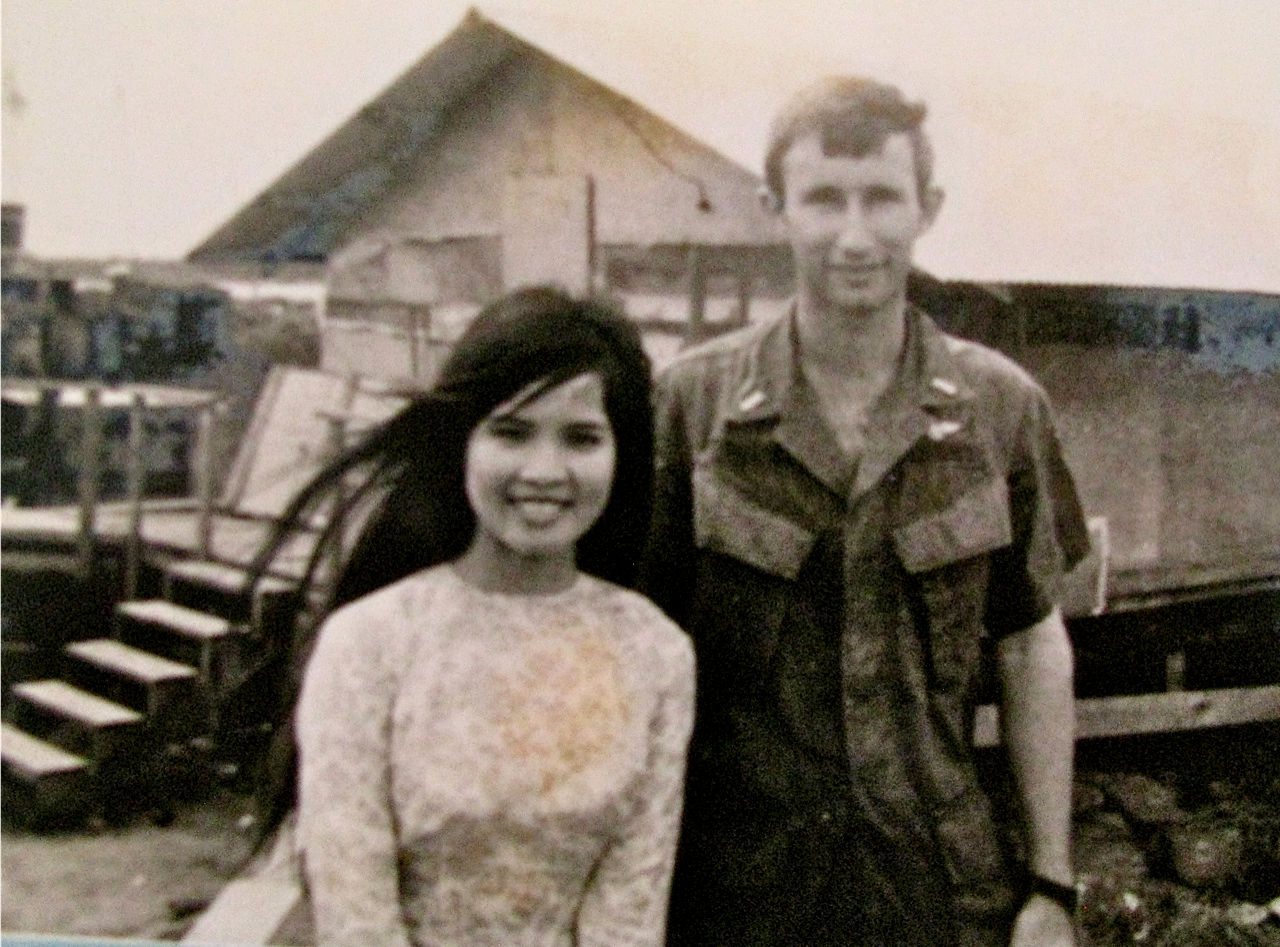 dreaded diseases and vengeful fathers committing acts of violence
against potential suitors. One or two lived semi-permanently in
private houses in a part of town dubbed ‘the married patch’. I had
already decided that the best way to stay out of trouble was to keep
as busy as possible by volunteering to fly at every opportunity, and
honouring my promise to write home every day. What else can you do
when you abandon your new bride for 12 long months?
dreaded diseases and vengeful fathers committing acts of violence
against potential suitors. One or two lived semi-permanently in
private houses in a part of town dubbed ‘the married patch’. I had
already decided that the best way to stay out of trouble was to keep
as busy as possible by volunteering to fly at every opportunity, and
honouring my promise to write home every day. What else can you do
when you abandon your new bride for 12 long months?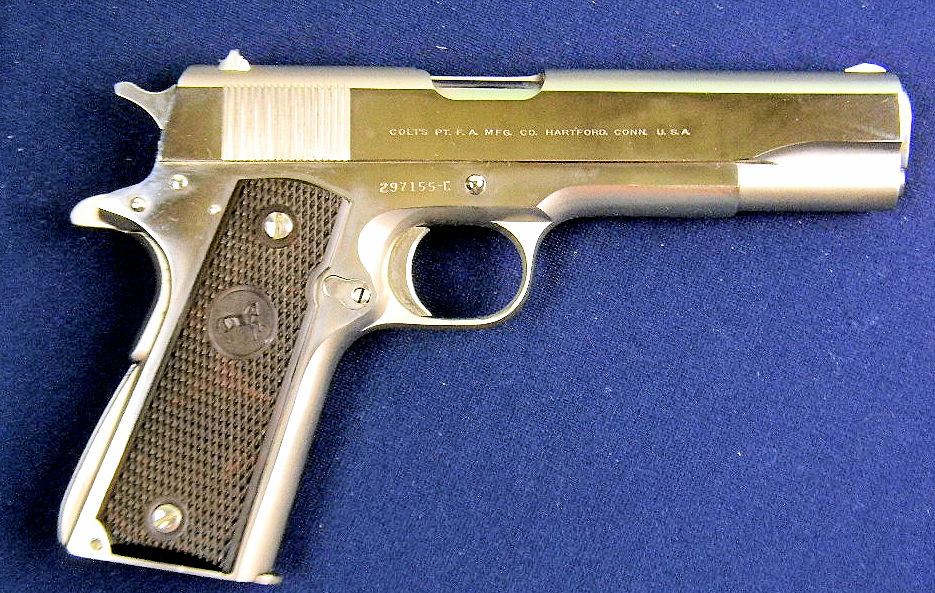 illa
since there was enough ammunition under the bed to hold off a
battalion. My first bit of housekeeping was to move it to a safer
location before I was accidentally or deliberately blown to kingdom
come in the middle of a pleasant dream. We all had personal issue
Colt .45 automatic pistols. Most of us discarded the issue webbing
belts and holsters in favour of cowboy-style leather belts and
holsters made by an enterprising downtown leather worker. These
included extra storage space for ammunition, loops on the belt and
clip holders. Wearing this get-up over our flying suits, along with
black peaked caps, we must have looked like extras on a western
movie set.
illa
since there was enough ammunition under the bed to hold off a
battalion. My first bit of housekeeping was to move it to a safer
location before I was accidentally or deliberately blown to kingdom
come in the middle of a pleasant dream. We all had personal issue
Colt .45 automatic pistols. Most of us discarded the issue webbing
belts and holsters in favour of cowboy-style leather belts and
holsters made by an enterprising downtown leather worker. These
included extra storage space for ammunition, loops on the belt and
clip holders. Wearing this get-up over our flying suits, along with
black peaked caps, we must have looked like extras on a western
movie set.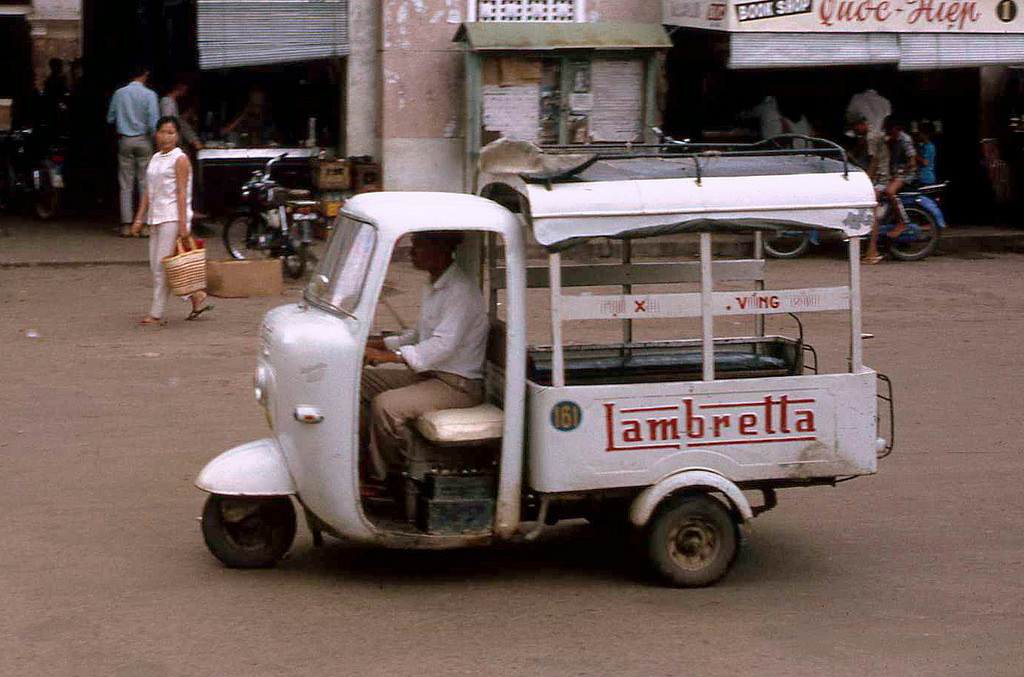 potholed, waterlogged roads at the hair-raising speed of 35 miles
per hour, was not exactly a picnic. The poncho failed to keep off
the torrential rain, which poured in through the open sides of the
jeep. There were few footpaths in Vung Tau; everyone walked on the
road. The inadequate windscreen wipers did little to help me avoid
pedestrians, cars, trucks, bicycles, Lambrettas, trishaws and pony
carts along the way. That morning, I had nearly run down a young
girl on a motor scooter when she decided to execute a particularly
unpredictable manoeuvre in front of me.
potholed, waterlogged roads at the hair-raising speed of 35 miles
per hour, was not exactly a picnic. The poncho failed to keep off
the torrential rain, which poured in through the open sides of the
jeep. There were few footpaths in Vung Tau; everyone walked on the
road. The inadequate windscreen wipers did little to help me avoid
pedestrians, cars, trucks, bicycles, Lambrettas, trishaws and pony
carts along the way. That morning, I had nearly run down a young
girl on a motor scooter when she decided to execute a particularly
unpredictable manoeuvre in front of me.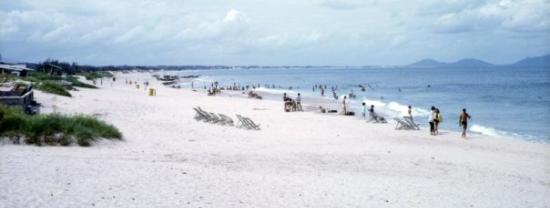 front
swastika. We passed two saffron-robed monks from the temples, shaven
heads perspiring, sandalled feet splashed with mud, walking on the
side of the road towards town.
front
swastika. We passed two saffron-robed monks from the temples, shaven
heads perspiring, sandalled feet splashed with mud, walking on the
side of the road towards town.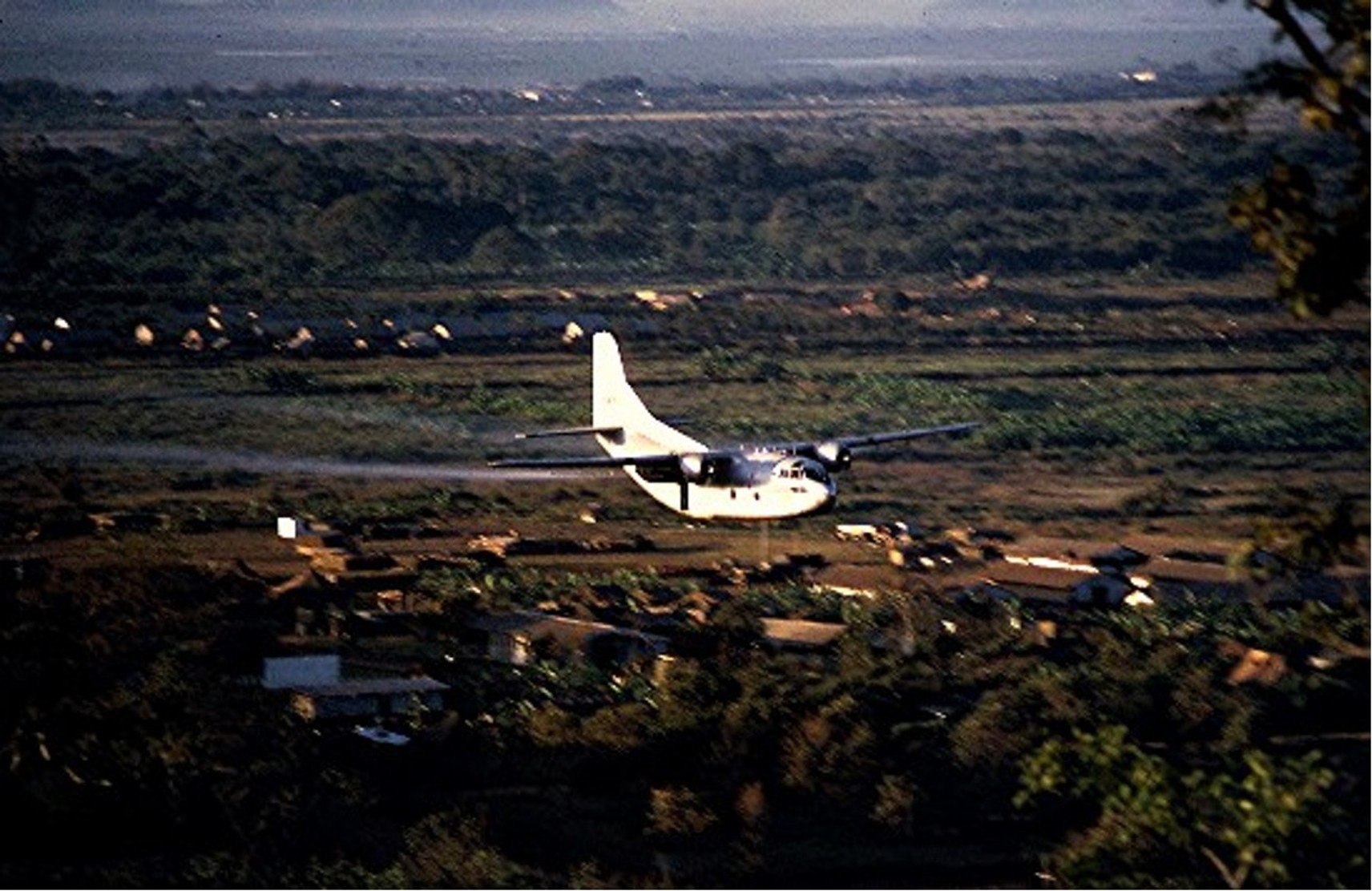 available. But you could not go anywhere outside the town unless it
was on a military aircraft. Some of our passengers, therefore, were
off duty military personnel, returning to Saigon after a day off
here. There would be Vung Tau people waiting at Saigon for our
return flight.
available. But you could not go anywhere outside the town unless it
was on a military aircraft. Some of our passengers, therefore, were
off duty military personnel, returning to Saigon after a day off
here. There would be Vung Tau people waiting at Saigon for our
return flight.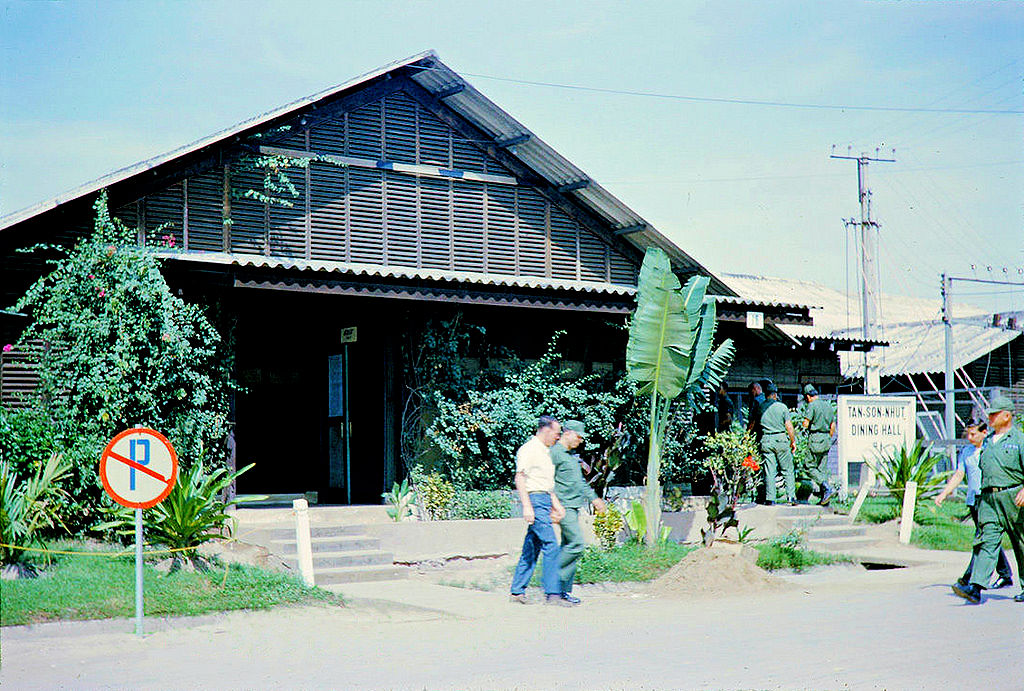
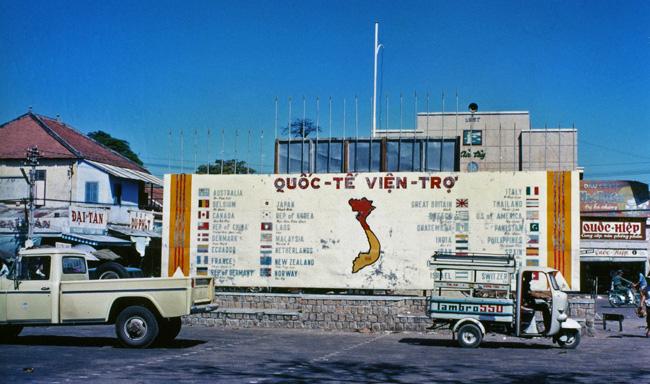 open-fronted buildings covered in lurid signs which constituted the
shopping area.
open-fronted buildings covered in lurid signs which constituted the
shopping area.